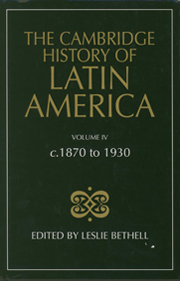Book contents
- Frontmatter
- 1 Latin America and the international economy, 1870–1914
- 2 Latin America and the international economy from the First World War to the World Depression
- 3 Latin America, The United States and the European powers, 1830–1930
- 4 The population of Latin America, 1850–1930
- 5 Rural Spanish America, 1870–1930
- 6 Plantation economies and societies in the Spanish Caribbean, 1860–1930
- 7 The growth of Latin American cities, 1870–1930
- 8 Industry in Latin America before 1930
- 9 The urban working class and early Latin American labour movements, 1880–1930
- 10 Political and social ideas in Latin America, 1870–1930
- 11 The literature, music and art of Latin America, 1870–1930
- 12 The Catholic Church in Latin America, 1830–1930
- Bibliographical essays
- Index
- References
12 - The Catholic Church in Latin America, 1830–1930
Published online by Cambridge University Press: 28 March 2008
- Frontmatter
- 1 Latin America and the international economy, 1870–1914
- 2 Latin America and the international economy from the First World War to the World Depression
- 3 Latin America, The United States and the European powers, 1830–1930
- 4 The population of Latin America, 1850–1930
- 5 Rural Spanish America, 1870–1930
- 6 Plantation economies and societies in the Spanish Caribbean, 1860–1930
- 7 The growth of Latin American cities, 1870–1930
- 8 Industry in Latin America before 1930
- 9 The urban working class and early Latin American labour movements, 1880–1930
- 10 Political and social ideas in Latin America, 1870–1930
- 11 The literature, music and art of Latin America, 1870–1930
- 12 The Catholic Church in Latin America, 1830–1930
- Bibliographical essays
- Index
- References
Summary
Introduction: the post-colonial church
The Church in Latin America after independence bore the marks of its Iberian and colonial past. From Spain Catholics inherited a tradition of strong faith, a basic doctrinal knowledge and an enduring piety. Observance itself was a medium of knowledge, for in the Mass, the Litanies and the Rosary the people learnt the doctrines, the scriptures, and the mysteries of the Catholic faith. Portugal too transmitted an orthodox Catholicism, but with less doctrinal knowledge and a lower degree of observance. Everywhere, religion in Latin America was a religion of the people, and the Church continued to receive the adherence and the respect of the Indians, mestizos and other popular sectors. Ruling groups were less committed, and the great fear of the Church in the nineteenth century was the apostasy of the elites, not the desertion of the masses. The Iberian tradition in religion favoured a privileged and a state-controlled Church. After independence, however, the wealth, influence and privileges of the Church were viewed by the new states as a rival focus of allegiance, an alternative power and a source of revenue. The threat of state control appeared in a new form. The Church had to look to its own resources and these in the early nineteenth century were diminishing.
Independence administered a great shock to the Church. To many it was the end of an epoch, the collapse of an entire world, the triumph of reason over faith. If Iberian power was broken, could the Catholic Church survive? Independence exposed the colonial roots of the Church and revealed its foreign origins. Independence also divided the Church. While some of the clergy were royalists, many were republicans, a few were insurgents, and most were influential in encouraging mass support for the new order once the last battle had been won.
- Type
- Chapter
- Information
- The Cambridge History of Latin America , pp. 527 - 596Publisher: Cambridge University PressPrint publication year: 1986
References
- 12
- Cited by



